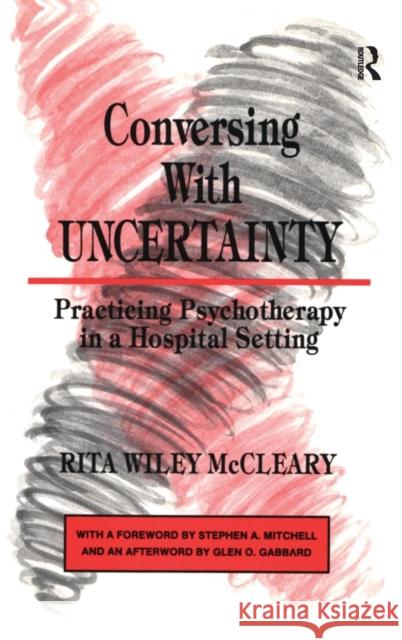Conversing With Uncertainty: Practicing Psychotherapy in A Hospital Setting » książka
Conversing With Uncertainty: Practicing Psychotherapy in A Hospital Setting
ISBN-13: 9780881631487 / Angielski / Twarda / 1992 / 172 str.
Conversing With Uncertainty: Practicing Psychotherapy in A Hospital Setting
ISBN-13: 9780881631487 / Angielski / Twarda / 1992 / 172 str.
(netto: 195,46 VAT: 5%)
Najniższa cena z 30 dni: 201,44
ok. 22 dni roboczych.
Darmowa dostawa!
Conversing with Uncertainty is a unique chronicle of why therapists must use theory while resisting the allure of theory, maintaining a double vision that allows them to appropriate theory only to break it open to enlarge the interactive and interpretive possibilities of therapy. But McCleary offers far more than a vivid experiential rendering of this insight. She argues persuasively, here in conversation with the writings of Irwin Hoffman and Lawrence Friedman, that a narrative case study - such as her case study of Kay - offers a unique window to comprehending the type of reflection that culminates in psychotherapeutic knowing. It follows, for McCleary, that case narratives are especially relevant to psychotherapeutic training, and by implication, to the way in which therapists acquire expertise. Framed by a foreword by Stephen Mitchell and an afterword by Glen Gabbard, Conversing with Uncertainty is the premier volume of the Relational Perspectives Book Series. It also introduces a gifted writer of rare therapeutic sensibility. For it is McCleary's achievement, finally, not merely to convey with arresting candor the stress and uncertainty of clinical training, but to use her encounter with Kay to probe with fresh insight perennial questions about the narrative structure of therapeutic knowledge, the experiential foundations of theory choice, and the use and abuse of theory in clinical practice.
Conversing with Uncertainty is a unique chronicle of why therapists must use theory while resisting the allure of theory, maintaining a double vision that allows them to appropriate theory only to break it open to enlarge the interactive and interpretive possibilities of therapy. But McCleary offers far more than a vivid experiential rendering of this insight. She argues persuasively, here in conversation with the writings of Irwin Hoffman and Lawrence Friedman, that a narrative case study - such as her case study of Kay - offers a unique window to comprehending the type of reflection that culminates in psychotherapeutic knowing. It follows, for McCleary, that case narratives are especially relevant to psychotherapeutic training, and by implication, to the way in which therapists acquire expertise.
Framed by a foreword by Stephen Mitchell and an afterword by Glen Gabbard, Conversing with Uncertainty is the premier volume of the Relational Perspectives Book Series. It also introduces a gifted writer of rare therapeutic sensibility. For it is McCleary's achievement, finally, not merely to convey with arresting candor the stress and uncertainty of clinical training, but to use her encounter with Kay to probe with fresh insight perennial questions about the narrative structure of therapeutic knowledge, the experiential foundations of theory choice, and the use and abuse of theory in clinical practice.











